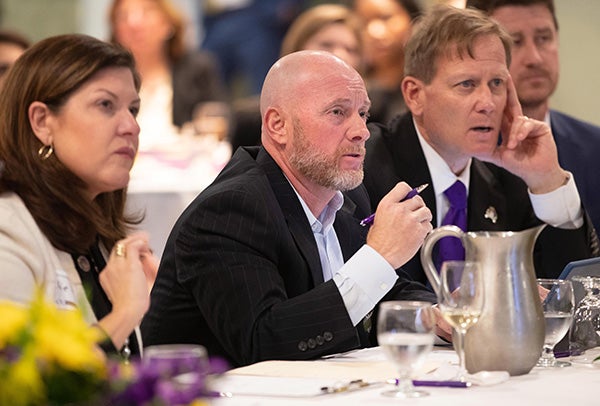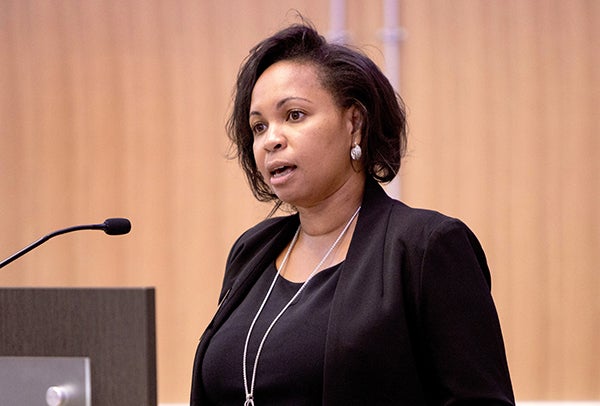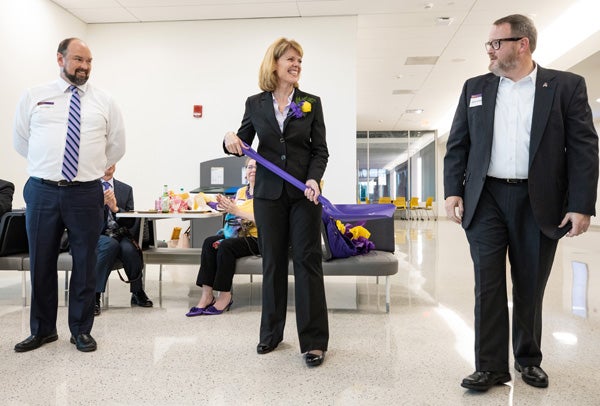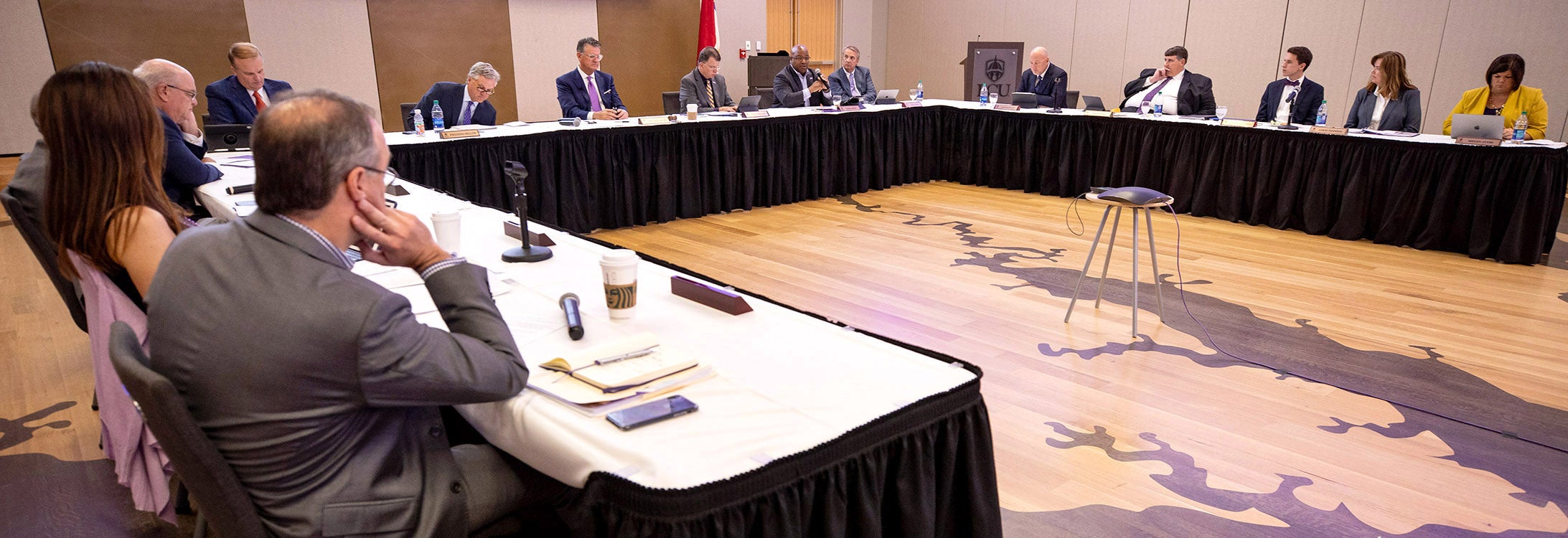CRISP CENTER
ECU announces new small business resource center
East Carolina University’s Board of Trustees approved the establishment of the Crisp Small Business Resource Center, which will be housed in the College of Business’ Miller School of Entrepreneurship, during its regular meeting Friday in the Main Campus Student Center.
The mission of the Crisp Center is to provide access to best practices and proven knowledge for ECU students and area entrepreneurs who plan to start or sustain enterprises in eastern North Carolina.

Matt Crisp judges participants in the second annual Pirate Entrepreneurship Challenge, the Miller School of Entrepreneurship’s signature pitch competition, in February.
The Crisp Center is possible thanks to a $1 million gift from Matt and Kim Crisp. As a Washington, North Carolina, native, Matt Crisp credits his family and his College of Business (COB) education for putting him on the path of success in both his career and life.
“The Crisp Center will play a significant role in connecting key assets in the Miller School with partners in eastern North Carolina and beyond,” said Dr. Mike Harris, director of the Miller School. “This will have a direct impact on the university’s mission of regional transformation.”
Specific activities that could come out of the Crisp Center include specialized research reports and grants, community workshops and executive education offerings. It will help convert curricular programs in the Miller School into actionable ideas and ventures created by students from all academic fields. Crisp Center efforts will also focus on working collaboratively across campus and with regional partners to sponsor events for both the research and business communities.
The Miller School’s annual Pirate Entrepreneurship Challenge and Summer Innovation Academy will be facilitated within the Crisp Center.
Two new committees of the board of trustees convened for the first time – the advocacy committee and the research and economic development committee.
The advocacy committee is part of an effort to coordinate unified advocacy for the mission of ECU, helping to advance local, state and federal policy that is consistent with the priorities identified by the UNC System Office and the ECU Board of Trustees.

Dr. Crystal Chambers, vice chair of the ECU Faculty Senate, briefs the board on that body’s activities and priorities.
The research and economic development committee received an overview of current economic development activities and leadership as well as an update on efforts to develop the millennial campus and bring a hotel to downtown Greenville. The university is exploring public-private partnerships with developers for both projects.
Sara Thorndike, vice chancellor for administration and finance, plans to bring additional information on both projects to the board in November. Approval would be needed by the ECU Board of Trustees and the UNC System Board of Governors; the millennial campus project also would require Council of State approval.
The university affairs committee received an update on the fall 2019 census numbers from Provost Ron Mitchelson and Dr. Ying Zhou, associate provost of institutional planning, assessment and research. Details from the report include a total enrollment figure of 28,651, down 67 students from last year but higher than projected. With the graduation of 7,312 students during the 2018-2019 academic year, officials knew keeping enrollment numbers steady would be a challenge.
The unweighted GPA (on a 4.0 scale) of the incoming freshman class is up this year, to 3.31.
In other business during the meetings of the board of trustees and its committees:
- Jon Gilbert, ECU athletics director, said football saw an 8.95% increase in ticket sales this year, and 89% of season ticket holders renewed their seats.
- The finance and facilities committee received a report from the accounting firm Cherry Bekaert on the projected athletics budget and long-term planning for overall budget forecasting. Athletic revenues were down in 2019 due to lower student enrollment, ticket sales, game guarantees and donations. Plans are underway to balance an expected shortfall for the 2020 year with an increase in revenue from student fees, athletic-generated revenues and university support.

Interim University Counsel and Vice Chancellor for Legal Affairs Paul Zigas, left, and Jody Newsome, also of the Office of University Counsel, right, look on as Donna Gooden Payne, ECU’s chief legal counsel since 2008, tries out a new purple snow shovel. Payne was recently named university vice president and general counsel for the University of Rochester in New York. The ECU Board of Trustees honored Payne on Thursday night with a reception in the Main Campus Student Center.
- Bill Bagnell, associate vice chancellor for campus operations, presented an update on repair, renovation and capital projects. Construction has started on the new Life Sciences and Biotechnology Center, while renovation work has been put on hold temporarily for Mendenhall Student Center. Officials expect to occupy a building being renovated on Fifth Street next to the registrar’s office in December.
- Vice Chancellor for University Advancement Chris Dyba provided a fiscal year fundraising update. He reported that as of Aug. 31, the university has raised $10.1 million. Of that total, East campus has raised $3.7 million, West campus has raised $509,964 and athletics has raised $5.9 million. The fiscal year began July 1.
- The athletics and advancement subcommittee welcomed Scott Francis, the new president of the ECU Alumni Association. Francis joins ECU from the University of Florida, where he was responsible for representing the university’s 422,000 alumni. “My vision for the ECU Alumni Association is to develop and execute programs and initiatives that transform the experience of being a Pirate,” he said.
- Jay Golden, vice chancellor for research, economic development and engagement, presented plans to increase student research experiences and mentorships and reduce debt for undergraduates through research.
- In the health sciences committee meeting, Vice Chancellor for ECU Health Sciences Mark Stacy presented an overview of the Brody School of Medicine’s preparation for reaccreditation activities that will take place next spring, and enrollment updates for Brody (up 2.1% from last fall), the College of Nursing (up 6.6%), the College of Allied Health Sciences (up 1.6%) and the School of Dental Medicine (no change).
- Stacy also discussed a number of strategic medical education, clinical and bench research projects the medical school could undertake to improve health long term in eastern North Carolina if it were to receive an annual mission payment from Vidant Health.

